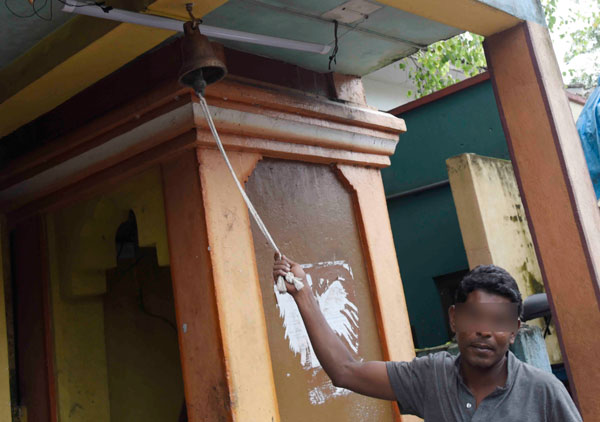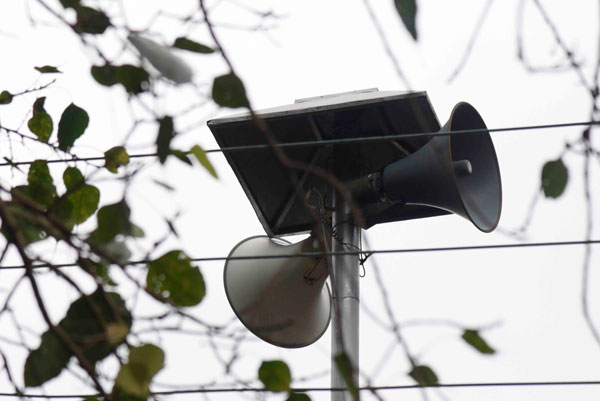News
It’s complicated: Sri Lanka’s relationship with loudspeakers
Kew Road in Colombo 2, like many other areas in Sri Lanka, is a multi-religious place of worship houses blasting their prayers on a daily basis. But what is soothing to some is a perennial nuisance to others.
“My mother likes to come to the temple and listen to the bana in the evening when everyone gathers to relax a bit after work,” said a 50-year old living in the housing scheme opposite the Buddhist temple, which is right next to a Hindu kovil on that street.
He said his mother’s quest for spiritual contentment is interrupted at least twice a week by police who are summoned there by disgruntled neighbours complaining against the chanting.

To ring or not to ring bells during prayer times
“We usually turn down the sound of the speaker so things don’t escalate,” he remarked. The bana is played for about an hour each day from 7 p.m.
Sri Lanka’s complicated relationship with loudspeakers has caused discontent and controversy on social media recently. Pages dedicated to eradicating “noise pollution” are popping up on Twitter and Facebook.
“I live right next to a temple,” one Twitter user told the Sunday Times. During the third wave of the COVID-19 pandemic, the head monk had fixed loudspeakers. There were prayers for 12 to 13 hours for nearly two weeks. “He ignored the multiple complaints from people in the area,” the resident of Kelaniya said.
In some areas communities were afraid to speak up. The Sunday Times visited the site of another complaint regarding a church on Polhengoda Road. While shopkeepers further away admitted loudspeakers were deployed often, those closer to the church claimed it didn’t happen. We were unable to contact the parish priest.
A Twitter user from Dehiwala complained that both the temple and mosque she lived next to had one time being “playing something really loud”. While this has stopped now, working online and answering calls at home had been impossible at that time.
There are no official guidelines issued to religious institutions on their use of loudspeakers, said Buddha Sasana Ministry’s Commissioner of Vihara Devalam Sahan Kuruppu. “We encourage everyone to practise their religion without causing a nuisance to other people.”
Despite being the governing body of religious activities in the country, the imposition of such guidelines was not practical as this would cause complications during festival times, the Commissioner said. “It would count as us infringing on the people’s right to religion if we tried to place too many restrictions,” he pointed out. The only legal intervention possible was under sound pollution legislation in the common law.

There are no official guidelines issued to religious institutions on loudspeakers (Pix by Akila Jayawardena)
“Sri Lanka is a secular nation,” agreed N.U.K. Sharma, the Swami of the Torrington Murugan Kovil. He had taken over the institution earlier this month and found there were contrasting opinions among neighbours about ringing bells during prayer times.
“It is the tradition to ring bells before a mass in most religions and we only ring the bell for 10 minutes,” he said, adding that, if and when loudspeakers were used, special permission was obtained.
Problems with noise aren’t limited to only religious places. Attorney-at-law Shiral Lakthilaka became familiar with the relevant laws when he was involved in an action against “deafening noise” from a construction site: the Noise Control Act 1996 and Regulations 1738 of 2011, promulgated under the National Environment Act. The first contains five schedules specifying decibel levels permissible at daytime and night. The regulations are guidelines for vehicle horns.
In 2008, then Chief Justice Sarath N Silva delivered a landmark Supreme Court decision stipulating conditions related to sound pollution. It established that noise pollution was a public nuisance and that police were obliged to entertain complaints from citizens in relation to public nuisances under Section 261 of the Penal Code.
People can complain about noise exceeding 60 decibels after 6 pm and loud noises between 10 pm and 6 am. If industrial construction activities happen in residential areas provided for in the Act, and the noise level exceeds maximum permissible levels, affected parties can lodge a complaint. Permitted decibel levels differ from day to night and from area to area.
“Police officers have to entertain the complaint under public nuisance and make the Magistrate’s court aware of the disturbance, but people need to be more aware of how and when to complain,” Mr Lakthilaka said.
The police however have limited resources to gauge decibel levels. “The police usually investigate instances of sound pollution when a complaint is made and not before,” said Police Spokesperson SSP Nihal Thalduwa.
The police then decide whether a sound is causing a nuisance based on the context and whether or not that sound level is “necessary” for that particular event. People were generally compliant with requests to reduce the volume as the police were authorised to confiscate and detain equipment that violates law.
Special permission, however, can be obtained in advance. That is the procedure followed when a musical show or a political rally is organised. But police retain the right to request people to reduce the volumes if there were complaints.
The best way to say that you found the home of your dreams is by finding it on Hitad.lk. We have listings for apartments for sale or rent in Sri Lanka, no matter what locale you're looking for! Whether you live in Colombo, Galle, Kandy, Matara, Jaffna and more - we've got them all!

